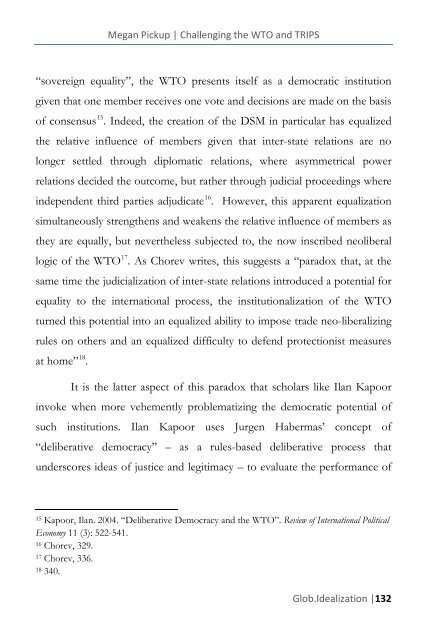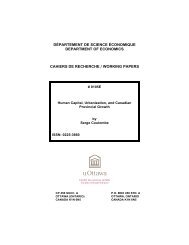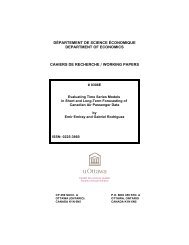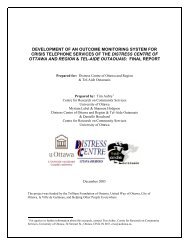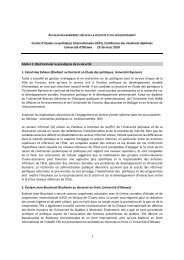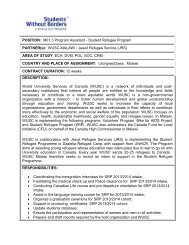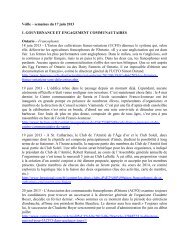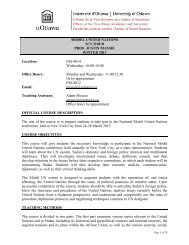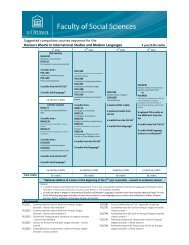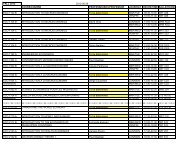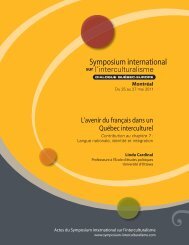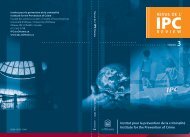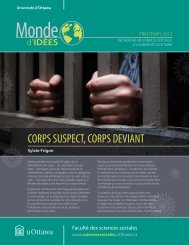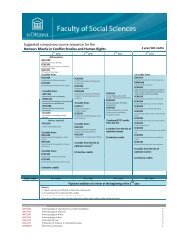GLOB.IDEALIZATION MOND.IDÉALISATION - Faculty of Social ...
GLOB.IDEALIZATION MOND.IDÉALISATION - Faculty of Social ...
GLOB.IDEALIZATION MOND.IDÉALISATION - Faculty of Social ...
You also want an ePaper? Increase the reach of your titles
YUMPU automatically turns print PDFs into web optimized ePapers that Google loves.
Megan Pickup | Challenging the WTO and TRIPS<br />
“sovereign equality”, the WTO presents itself as a democratic institution<br />
given that one member receives one vote and decisions are made on the basis<br />
<strong>of</strong> consensus 15 . Indeed, the creation <strong>of</strong> the DSM in particular has equalized<br />
the relative influence <strong>of</strong> members given that inter-state relations are no<br />
longer settled through diplomatic relations, where asymmetrical power<br />
relations decided the outcome, but rather through judicial proceedings where<br />
independent third parties adjudicate 16 . However, this apparent equalization<br />
simultaneously strengthens and weakens the relative influence <strong>of</strong> members as<br />
they are equally, but nevertheless subjected to, the now inscribed neoliberal<br />
logic <strong>of</strong> the WTO 17 . As Chorev writes, this suggests a “paradox that, at the<br />
same time the judicialization <strong>of</strong> inter-state relations introduced a potential for<br />
equality to the international process, the institutionalization <strong>of</strong> the WTO<br />
turned this potential into an equalized ability to impose trade neo-liberalizing<br />
rules on others and an equalized difficulty to defend protectionist measures<br />
at home” 18<br />
.<br />
It is the latter aspect <strong>of</strong> this paradox that scholars like Ilan Kapoor<br />
invoke when more vehemently problematizing the democratic potential <strong>of</strong><br />
such institutions. Ilan Kapoor uses Jurgen Habermas’ concept <strong>of</strong><br />
“deliberative democracy” – as a rules-based deliberative process that<br />
underscores ideas <strong>of</strong> justice and legitimacy – to evaluate the performance <strong>of</strong><br />
15 Kapoor, Ilan. 2004. “Deliberative Democracy and the WTO”. Review <strong>of</strong> International Political<br />
Economy 11 (3): 522-541.<br />
16 Chorev, 329.<br />
17 Chorev, 336.<br />
18 340.<br />
Glob.Idealization |132


